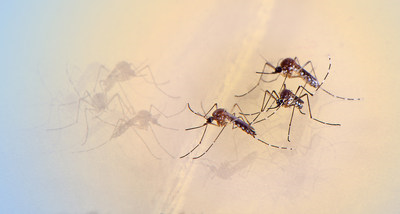SC Johnson Entomologists Outline Three Tips to Help Prevent Mosquito Bites During Summer
Fight the Bite While on the Go by Properly Applying Repellent

RACINE, Wis., June 25, 2018 /3BL Media/ – Known for taking the fun out of picnics, trips to the beach and other outdoor activities, mosquitoes especially earn their annoying reputation during warm summer months. Marking the start of National Mosquito Control Awareness Week, the mosquito experts from the SC Johnson Institute of Insect Science for Family Health are offering three useful tips to help protect you and your family from mosquito bites.
“Mosquitoes are primarily attracted to us by the carbon dioxide we breathe out when we exhale,” said Kelly M. Semrau, Senior Vice President – Global Corporate Affairs, Communication and Sustainability at SC Johnson. “When planning a day outdoors, consider using a repellent that provides a skin barrier and makes mosquitoes unable to land on and bite you.”
Properly applying repellent can be the difference between a good time with family and friends or considering cutting short a fun day outdoors. Choosing the right personal insect repellent and following the instructions on its label will help keep the mosquitoes at bay, allowing more time for making memories outdoors. Consider these tips from the expert entomologists at the SC Johnson Institute of Insect Science for Family Health:
Select the Right Repellent
Repellents come in many forms, including lotions and aerosol sprays. They often contain active ingredients such as DEET and Icaridin (also known as Picaridin, KBR 3023 or Saltidin.) Both active ingredients are effective in repelling mosquitoes and work by forming a vapor barrier at the skin’s surface that affects the scent receptors in the biting insect, which makes it hard for them to recognize where to land and bite you.
Generally, the more active ingredient a product contains, the longer it will last. A higher concentration of an active ingredient means mosquitoes will be repelled for a longer time. Higher concentrations are appropriate for activities that involve being outside for an extended time. Lower concentrations work well for activities that will keep you outside for only a few hours. Before each application of a personal insect repellent, first read the product label to ensure that you’re using it the correct way and always follow the manufacturer’s instructions.
Apply Repellents Only on Exposed Skin and Clothes
Repellents should be used only on exposed skin and clothing to prevent mosquitoes from biting. If using a personal insect repellent aerosol spray, for example, it is generally recommended to shake the can first, and then hold it 15-20 centimeters, or 6-8 inches, away from exposed skin and clothing. Spray in a slow sweeping motion and apply just enough to cover exposed skin. Applying an excess of repellent doesn’t equate to stronger coverage. Never apply repellents underneath clothing or directly on certain fabrics such as rayon, spandex, acetate or other synthetic fabrics.
Use Caution When Applying to Your Face
To use repellent on your face, apply it to your hands first, and then distribute it over your face and neck. Avoid contact with your eyes, lips and ears. After application, wash your hands thoroughly with water and soap. Never spray or rub the product over cuts, wounds or irritated skin.
Additionally, it is also important for the application of personal insect repellents on children to be supervised by an adult. Review the product label for information about child age usage restrictions and be sure to follow the directions for application and use. Start by spraying or applying cream to your own hands first, then apply it to the child.
For more information on things you can do to help protect yourself and your family against mosquitoes, please visit www.scjohnson.com/mosquitoes Additional education materials and resources are available on the site in 13 languages.
Contact:
SC Johnson Global Public Affairs
USPublicAffairs@scj.com
262-260-2440
###
About the SC Johnson Institute of Insect Science for Family Health
The SC Johnson Institute of Insect Science for Family Health – previously known as the SC Johnson Entomology Research Center – was established in 1957. Its main location in Racine, Wisconsin, is one of the world’s largest private, urban entomology research centers. In 2013, SC Johnson expanded its research operations globally, opening the first-of-its-kind research facility in China. Company researchers study and advance the sciences of insect biology, physiology, ecology, behavior and toxicology. The Institute also tests pest control formulations and delivery systems to help families protect themselves from insects and the diseases they may carry. Insights from the Institute help SC Johnson in the development of its OFF!®, Raid®, Baygon®, Autan®, AllOut® and other consumer pest control brands that have been trusted by families for generations. For more information, please go to www.scjohnson.com/mosquitoes
About SC Johnson
SC Johnson is a family company dedicated to innovative, high-quality products, excellence in the workplace and a long-term commitment to the environment and the communities in which it operates. Based in the USA, the company is one of the world’s leading manufacturers of household cleaning products and products for home storage, air care, pest control and shoe care, as well as professional products. It markets such well-known brands as GLADE®, KIWI®, OFF!®, PLEDGE®, RAID®, SCRUBBING BUBBLES®, SHOUT®, WINDEX® and ZIPLOC® in the U.S. and beyond, with brands marketed outside the U.S. including AUTAN®, TANA®, BAMA®, BAYGON®, BRISE®, KABIKILLER®, KLEAR®, MR MUSCLE® and RIDSECT®. The 132-year-old company, which generates $10 billion in sales, employs approximately 13,000 people globally and sells products in virtually every country around the world. www.scjohnson.com

